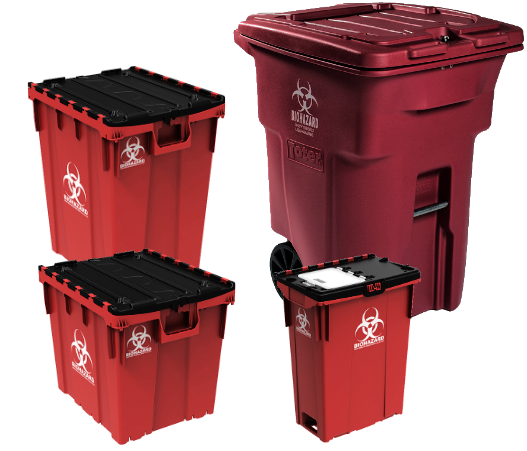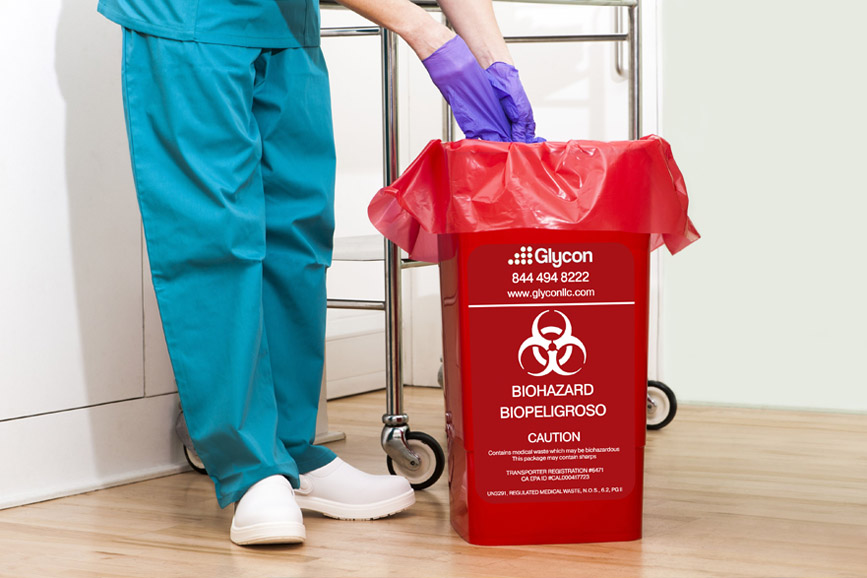Your Trusted Companion: Medical Waste Removal Services Tailored to Your Requirements
Your Trusted Companion: Medical Waste Removal Services Tailored to Your Requirements
Blog Article
Stay Ahead of Rules: Specialist Advice on Medical Garbage Disposal
In a world where the medical care market is frequently advancing, it is crucial for clinical centers to stay in advance of policies when it involves the correct disposal of clinical waste. With rigid guidelines and frequent governing changes, it can be challenging to navigate the complexities of this process. However, with professional guidance, centers can make certain conformity and reduce dangers linked with inappropriate garbage disposal. From understanding the different groups of clinical waste to carrying out the ideal collection and segregation methods, this discussion will certainly supply useful insights and actionable tips to help centers remain ahead of regulations in the ever-changing landscape of clinical garbage disposal.
Recognizing Medical Waste Categories
Recognizing medical waste groups is vital for correct disposal and administration in medical care facilities. Clinical waste describes any kind of waste generated by healthcare tasks that may posture a risk to public wellness or the environment. It is critical to categorize clinical waste properly to ensure its risk-free handling, transport, disposal, and therapy.
There are numerous categories of medical waste that health care centers need to be acquainted with. One of the most usual categories include contagious waste, pathological waste, sharps waste, pharmaceutical waste, and chemical waste. Each classification has details guidelines and policies for its appropriate administration and disposal.
Transmittable waste consists of materials contaminated with blood or other bodily liquids, such as handwear covers, dress, and research laboratory societies. Pathological waste describes human cells, body organs, or body components that call for special delivery and disposal. Sharps waste consists of used needles, syringes, and other sharp items that can trigger injury and transfer infections. Drug waste makes up ended, extra, or polluted medications that require cautious handling and disposal. Chemical waste includes solvents, disinfectants, and other chemical substances used in medical care centers.
Remaining Up-To-Date With Regulatory Modifications
Staying existing with governing adjustments is vital for healthcare centers to guarantee conformity and appropriate administration of medical garbage disposal. medical waste removal service. With laws constantly progressing, it is crucial for healthcare facilities to remain up-to-date to avoid fines, fines, and potential injury to the atmosphere and public health
To remain ahead of governing modifications, healthcare centers ought to develop a system for tracking and monitoring updates. This can be done by signing up for regulatory e-newsletters, attending meetings and workshops, and proactively joining sector associations. In addition, facilities need to designate a team member or group in charge of remaining notified and sharing details to relevant stakeholders.
Normal communication with governing agencies is additionally important. Health care centers ought to develop relationships with regional, state, and government agencies to ensure they recognize any modifications in laws that may affect their waste monitoring practices. This can be done with routine conferences, participation in public comment durations, and aggressive engagement with regulatory companies.
Furthermore, medical care facilities must consider partnering with waste monitoring companies that focus on medical waste disposal (medical waste disposal services with WasteX). These companies are typically fluent in the current laws and can provide assistance and support to make sure conformity
Applying Correct Collection and Partition Approaches
To effectively manage medical waste disposal, healthcare facilities must develop correct collection and partition approaches according to governing standards. Carrying out these techniques makes sure the risk-free handling and disposal of potentially dangerous materials, protects the setting, and decreases the threat of injuries and infections to health care workers and the general public.
Proper collection and partition techniques include using assigned containers and labeling systems. Medical care centers ought to offer clearly labeled containers for various kinds of medical waste, such as sharps, infectious waste, pharmaceutical waste, and non-hazardous waste. These containers need to be color-coded and plainly marked to avoid confusion and advertise simple identification.
In addition, medical care facilities should educate their team on the proper treatments for collecting and segregating clinical waste. This consists of enlightening them on the different sorts of waste, the proper containers to use, and the importance of adhering to guidelines and regulations. Normal training sessions and refresher training courses must be conducted to make sure that team member remain current on best techniques.
Moreover, healthcare facilities need to establish a system for normal collection and disposal of medical waste. This may entail partnering with certified waste monitoring business that concentrate on medical garbage disposal. These companies will make certain that the collected waste is moved and taken care of in compliance with medical waste disposal services with WasteX regulative needs.
Choosing the Right Disposal Techniques

Incineration is one of the most common and effective techniques for taking care of particular sorts of clinical waste, such as pathological waste and sharps. It entails the regulated burning of waste at high temperature levels, lowering it to ash. Nonetheless, incineration can launch unsafe toxins right into the air and add to air pollution.

Various other disposal methods consist of chemical treatment, microwave therapy, and landfilling. Chemical treatment includes using chemicals to decontaminate and neutralize the waste. Microwave therapy utilizes microwave power to warmth and disinfect the waste. Landfilling entails burying the waste in a marked landfill location (medical waste disposal services with WasteX). Landfilling needs to be the last hotel due to the potential risk of contamination to soil and groundwater.
Guaranteeing Compliance Through Documentation and Training
After thoroughly thinking about the suitable disposal methods for medical waste, healthcare centers have to make certain conformity with guidelines and lessen environmental effect by executing effective documents and training treatments. This action is important in preserving a lasting and risk-free environment for both healthcare employees and the public.

Training is similarly vital in ensuring compliance with guidelines. Medical care workers who manage clinical waste needs to receive suitable training on waste segregation, managing, and disposal treatments. This training should cover topics such as the proper use of personal protective devices, recognition of various kinds of waste, and the proper disposal methods for each waste category. By providing extensive training, health care facilities can equip their personnel to make educated decisions and reduce the danger of incorrect waste disposal.
Final Thought
In final thought, staying in advance of guidelines in medical waste disposal is essential for healthcare centers. medical waste removal near me. Comprehending the different categories of clinical waste, remaining upgraded with governing adjustments, implementing appropriate collection and partition approaches, picking the appropriate disposal methods, and ensuring conformity through documentation and training are all crucial actions. By following these standards, health care organizations can successfully dispose and take care of of clinical waste in a safe and liable manner
From recognizing the different groups of medical waste to applying the ideal collection and partition techniques, this conversation see page will give important understandings and actionable pointers to aid facilities remain ahead of guidelines in the ever-changing landscape of clinical waste disposal. - medical waste disposal services with WasteX
The most common classifications consist of transmittable waste, pathological waste, sharps waste, pharmaceutical waste, and chemical waste. Medical care centers should offer clearly Our site identified containers for various kinds of clinical waste, such as sharps, transmittable waste, pharmaceutical waste, and non-hazardous waste. Medical care centers ought to develop a comprehensive system to tape-record and track all elements of medical waste disposal, including types of waste generated, quantities, and disposal methods used. Healthcare workers who handle clinical waste needs to receive suitable training on waste segregation, handling, and disposal treatments.
Report this page